I have spent this past weekend at DragonCon, catching up with friends, meeting new people, and returning an air of normalcy to my professional calendar. To be honest, I went into the weekend a bit reluctantly. I was excited to catch up with friends, but I was nervous about little things — Covid exposure at a convention attended by tens of thousands, and also just being back among so many people after a difficult year in which I have, to the extent possible, tended to avoid public activities.
As it turned out, being among people was fine. Not always easy, but definitely not as difficult as I feared. My friends know me well enough (and are thoughtful enough) to understand how to be supportive and sympathetic without being intrusive. And others . . . well, there’s no rule that says we have to bare our souls to all we meet, right? It’s okay sometimes to put on a smile and answer “How are you doing?” with the immediate truth rather than the longer-term assessment. “I’m good thanks [at this moment]. How are you?”
This all should be second nature, I know. People do this stuff all the time. But it’s not always easy to give ourselves room to be private when we’re in public spaces and situations. And as for the Covid exposure . . . Time (and antigen tests) will tell.
My panels — on writing, urban fantasy, high fantasy, alternate history — were fun. Good discussions and excellent work by our moderators. It was, as always, so great to talk shop with fellow pros and answer terrific questions from engaged, informed audiences. My reading was attended by a few fans, and the occasion allowed me the opportunity to try out the opening chapters from my latest project, the Celtic urban fantasy I’ve been writing about recently in this blog and on social media. I read from The Fugitive Stone, book I in the series. The chapters were very well-received.
In fact, I should say that every time I mentioned the Celtic series (which STILL needs a series name) the response from people was very positive. Interest, enthusiasm even, and lots of eager curiosity. I’m excited.
I missed home, of course. I am a homebody when it comes right down to it, and I would always rather be with Nancy than not. And at this point, I’m pretty exhausted. It’ll take me half the week to recover and settle back into work and routine. But it was worth it. DragonCons are ALWAYS worth it.
To my friends who were at the con — you know who you are — thank you for contributing to a great weekend. To those who attended the panels, as well as my reading and signing, thank you so much for taking time out of your con to listen and chat with us. We appreciate it more than you can know. Without you, there is no con. And finally, to the con organizers and track leaders, thank you so much for all you do. Your hard work and selfless efforts make possible everything that the rest of us enjoy so much.
Already looking forward to next year.









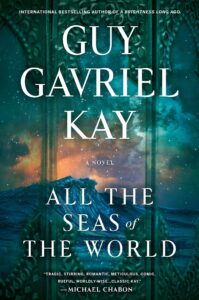 After publishing
After publishing 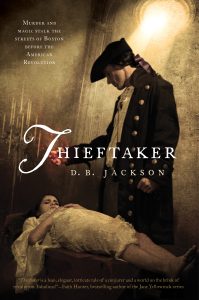 I would love to be a bestselling author. And with each new project I take on, I wonder if this might finally be the literary vehicle that gets me there. Thieftaker, Fearsson, the time travel books, the Radiants franchise. I had high hopes for all of them. All of them were critical successes. None of them has taken me to that next level commercially. So does that mean I should give up?
I would love to be a bestselling author. And with each new project I take on, I wonder if this might finally be the literary vehicle that gets me there. Thieftaker, Fearsson, the time travel books, the Radiants franchise. I had high hopes for all of them. All of them were critical successes. None of them has taken me to that next level commercially. So does that mean I should give up?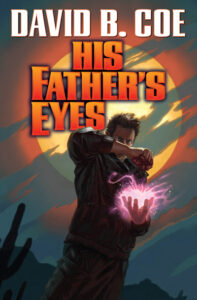 The difference between what I did with those two projects and what I am telling you not to do is this: I kept working on these books, but I also moved ahead with other projects, so that I wouldn’t stall my career. Yes, I worked for six years on the first Fearsson book. But in that time, I also wrote the Thieftaker books and the Robin Hood novelization. This, by the way, is also the secret to finding that balance I mentioned. By all means, keep working on the one idea, but do so while simultaneously developing others. Don’t become so obsessed with the one challenge that you lose sight of all else.
The difference between what I did with those two projects and what I am telling you not to do is this: I kept working on these books, but I also moved ahead with other projects, so that I wouldn’t stall my career. Yes, I worked for six years on the first Fearsson book. But in that time, I also wrote the Thieftaker books and the Robin Hood novelization. This, by the way, is also the secret to finding that balance I mentioned. By all means, keep working on the one idea, but do so while simultaneously developing others. Don’t become so obsessed with the one challenge that you lose sight of all else. When I am not in these panels, I will be at my table in Author’s Alley, signing and selling books. I also plan to have with me some of
When I am not in these panels, I will be at my table in Author’s Alley, signing and selling books. I also plan to have with me some of 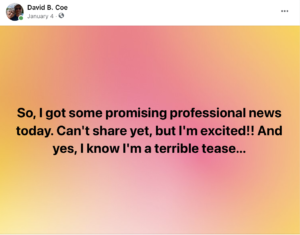 Nearly two months ago, early in the new year, I posted on social media that I had some exciting professional news I couldn’t share quite yet. I was thrilled, and wanted to let people know. But I also didn’t want to say anything before all the details had been settled. So I posted my little teaser, forgetting the one immutable rule of the publishing business: Things always happen slower than one thinks they will.
Nearly two months ago, early in the new year, I posted on social media that I had some exciting professional news I couldn’t share quite yet. I was thrilled, and wanted to let people know. But I also didn’t want to say anything before all the details had been settled. So I posted my little teaser, forgetting the one immutable rule of the publishing business: Things always happen slower than one thinks they will.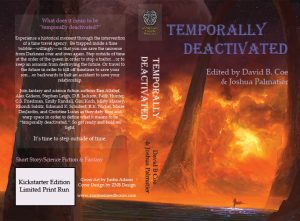 Since writing it, though, I have become sort of fixated on the idea. I am editing my fourth anthology, and already looking at the possibility of editing another. My freelance editing business is attracting a steady stream of clients — I’m booked through the spring and have had inquiries for slots later in the year.
Since writing it, though, I have become sort of fixated on the idea. I am editing my fourth anthology, and already looking at the possibility of editing another. My freelance editing business is attracting a steady stream of clients — I’m booked through the spring and have had inquiries for slots later in the year.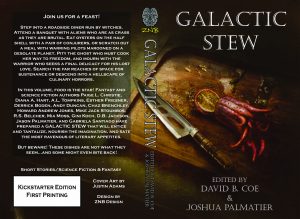 I am not an acquiring editor. I do decide, along with my co-editor, whose stories will be in the anthologies I edit, so I suppose in that way I am determining the fate of submissions and, in a sense, “buying” manuscripts. But, for now at least, I don’t make decisions about the fate of novels, and so I don’t have to go toe-to-toe with agents. Good thing. They scare me. (Looking at you, Lucienne Diver.)
I am not an acquiring editor. I do decide, along with my co-editor, whose stories will be in the anthologies I edit, so I suppose in that way I am determining the fate of submissions and, in a sense, “buying” manuscripts. But, for now at least, I don’t make decisions about the fate of novels, and so I don’t have to go toe-to-toe with agents. Good thing. They scare me. (Looking at you, Lucienne Diver.)